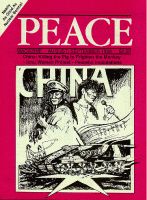
Peace Magazine Aug-Sep 1989, page 5. Some rights reserved.
Search for other articles by various here
The China crisis may bury interest in the Romanian [cultural] genocide (that's what it is). Similarly, when the Hungarian people tried to assert itself in 1956, Western attention was diverted by the battle over control of the Suez Canal. That's history.
Andrew Kapos, Toronto
Wally Keeler's phrase "forced cultural assimilation" to describe the situation of Hungarians in Romania is inaccurate and misleading. Assimilation means absorption into a dominant culture, which, as a recent immigrant, I am experiencing now; it does not require me to deny my original cultural heritage.
Cultural genocide is occurring in Romania. When Hungarian cultural centres are gutted, gravemarkers removed from cemeteries, birth and baptism records pulped, Hungarian forbidden to be spoken in public, even by children, and when thousands of refugees fleeing persecution and starvation are murdered by border authorities, it is not called assimilation.
When 8,000 ancestral villages are marked for total destruction, forcing the re-settlement of over five million people into 500 barrack-like complexes, it is not called assimilation.
In the same issue of PEACE the article, Ecocidal Wars, refers to "genocide" in Guatemala and East Timor. You also review a book (p. 25) about Canada's natives subtitled, "People Resisting Genocide." Why is it impossible to use the correct phrase, "cultural genocide" to reference to a socialist republic in the East Bloc? Why do you belittle the suffering endured by my people?
Brigitta Bali, Toronto
In Europe [where we are spending a sabbatical year] the social-democratic parties are not where it's at in terms of innovative approaches to social change, ecology, peace and security, and human rights. Although I hope the NDP still stands for these things in Canada, we seem to be in the wrong "international."
In March a Coalition for Social Defence was founded in Minden, West Germany. It is an politically and ideologically independent body of some 20 peace/ecology groups and independent members (activists, academics, politicians) committed to building a violence-free demilitarized, ecologically responsive and just society. It seeks personal and collective means of living that enhance democracy and make society able to defend itself through nonviolent resistance. The founding slogan is "Without Weapons, but not Defenceless." Petra Kelly of the Greens and Professor Theodor Ebert, peace researcher and political scientist at the Free University, were elected. Fourteen working groups around the country carry out the practical work of the organization.
Hania Fedorowicz, Ostermiething, Austria
The leukemia study mentioned in the tritium article (PEACE June/July 1989) was actually conducted by the Atomic Energy Control Board, quite apart from the work Durham Nuclear Awareness is doing on health effects of exposure to radiation. The leukemia study shows an increase of childhood leukemia in people around nuclear facilities. It was set up to reassure Ontario that the nuclear industry is not adversely affecting our health. The AECB did not expect to find what they did find. Nevertheless, Ontario Hydro says they are reassured by the results (because we are not experiencing the high rates of leukemia present around the British facility on which our own studies were based). The study around Sellafield shows 9 times the rate of leukemia normally expected. The leukemia cases around Pickering are 37 percent higher than expected.
Irene Kock, Nuclear Awareness Project, Oshawa
The Canadian government has long claimed not to possess any chemical weapons (except ones for riot and crowd control). Yet we learn from the Barton Report that the Defence Research Establishment Suffield (DRES) stores 18 tons of chemical warfare agents, plus 150 tons of toxic "contaminated materials."
The government does not consider mustard gas, nerve gas, and other chemical warfare agents as weapons unless they are in a delivery system (e.g. bombs). This definition is misleading at best, all the more so because the public did not learn about tons of stored agents until 1988. If Iran, Iraq, or Egypt stored hundreds of tons of chemical agents, wouldn't we call them weapons?
Negotiators at the Conference on Disarmament in Geneva are working on a better definition of a chemical weapon, which will cover toxic chemicals. Canada is contributing to developing the Chemical Weapons Convention, to ban chemical weapons globally. I hope Canada will change its definition to clarify the facts.
Walter Dorn, Science for Peace, Toronto

Peace Magazine Aug-Sep 1989, page 5. Some rights reserved.
Search for other articles by various here